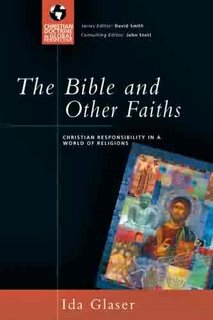 In a Yahoo discussion group Amos Yong of Regent College stimulated my thinking about an aspect of the encounter between evangelicals and adherents of other religions. He touched on implications from Jesus’ teachings from the parable of the Good Samaritan, as well Matt. 25 where Jesus states that how we respond to those in need reflect our reception (or denial) of him. Yong wondered how our treatment of the “religious other” might also be included in this passage of Scripture.
In a Yahoo discussion group Amos Yong of Regent College stimulated my thinking about an aspect of the encounter between evangelicals and adherents of other religions. He touched on implications from Jesus’ teachings from the parable of the Good Samaritan, as well Matt. 25 where Jesus states that how we respond to those in need reflect our reception (or denial) of him. Yong wondered how our treatment of the “religious other” might also be included in this passage of Scripture.I found this perspective of great interest. Evangelicals spend a lot of time considering the soteriological destiny of those in other religions, defining orthodoxy in relation to heresy, and formulating evangelistic and mission strategies in this regard. But we spend little time reflecting on what God is doing in the Christian as they interact with those of other faiths. We are rightly concerned about a number of issues in the interfaith encounter, but we may be neglecting one of the most important issues in the process.
As I continue to consider the importance of this issue I was fortunate recently to come across an organization called Faith to Faith in the United Kingdom. An Internet search turned up this Christian consultancy which addresses the issue raised above as it also attempts to formulate a balanced Christian perspective in light of religious pluralism in the U.K., an approach similar to that of my own Neighboring Faiths Project in the U.S.
Faith to Faith was directed in the past by Ida Glaser, who is now senior teaching and research fellow for the Edinburgh Centre for Muslim-Christian Studies. She is the author of a wonderful book I am now reading (one of several!) titled The Bible and Other Faiths: Christian Responsibility in a World of Religions (IVP, 2005). The book is part of a series on Christian Doctrine in Global Perspective, with John Stott serving as the Consulting Editor. This book is extremely helpful in that it not only provides a global perspective on the question of religious pluralism, but also moves beyond traditional Christian approaches to the topic in order for Christians to reflect on what the Lord requires of us in the interreligious encounter. A brief excerpt from the first chapter provides a hint of the treat this book provides:
In August 2001 I led a seminar for teachers from theological colleges in Uganda. We were thinking about how and why they taught Islam. The key question, I suggested to them, is “How should we as Christians live in relation to Muslims? What does God want of us?” We looked at the Sermon on the Mount, at the great commandment of Matthew 22:39 and at the Great Commission of Matthew 28:18-20. Then we read Micah 6:8: “He has showed you, O human being, what is good. And what does the Lord require of you? To act justly and to love mercy and to walk humbly with your God” (author’s translation).Glasser’s book brings a helpful perspective for Christians living amidst America’s increasing religious diversity and who are concerned not only with sharing the faith across religious cultures, but also with the process of transformation through the Spirit that comes with our yielding to a life of service and love for those from the world’s religions (and new religions) that we live with in our neighborhoods.
Then I asked, “How are we getting along? Are we living like that in relation to Muslims? What stops us?”
The answers came immediately: “Muslims say that Jesus is not the Son of God. They criticize the Bible. They won’t let us preach. They are setting up lots of new mosques. They want to take over our town. They are persecuting Christians in Sudan. They won’t eat our food. They are trying to marry our daughters …”
I repeated what they had said, and they got the point. Even if all those things are true, is there anything in Muslims that Christians can blame for their own lack of obedience to God? Nothing in Muslims, Hindus, Sikhs, Buddhists, atheist or even other Christians can stop us from doing what God requires. Only what is in us can do that.
1 comment:
John challenging thoughts, we acn't ignore what it means to love our neighbours. To love and remain true to our faith...does not mean we disengage, live in fear and ignorance. Can we love one another, and respect one anothers faith. I just recently came aross this article, an interview with Shane Claiborne and Tony Campola,
http://www.crosscurrents.org/CompoloSpring2005.htm
Post a Comment